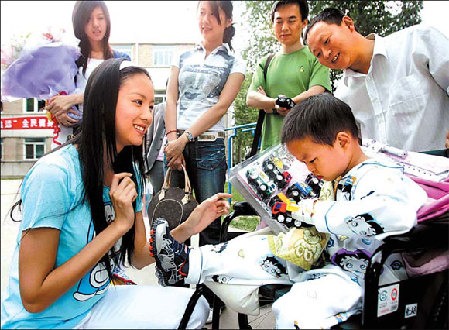
Zhang Zilin, China's reigning Miss World, chats yesterday with a young boy who survived the Sichuan earthquake. His temporary home is a school in Beijing.
Desperate to get on with the job of rebuilding her life, Chen Shirong's key task yesterday was regaining her identity.
Like those of countless others, the wife and mother's personal documents were lost in the May 12 earthquake.
"We desperately need to retrieve our bank cards so we can withdraw money to support our child," Chen said.
In order to do that, she first had to prove her identity to the local authorities.
The county government has estimated that about 90,000 residents of Beichuan - half the population - lost their personal credentials in the quake.
When Chen and her husband arrived yesterday morning at the city's administrative center to apply for new ID cards, there was already a long line of people ahead of them.
Police there said about 600 people have been arriving daily to apply for new documents. "We used to be a tiny department at the police station, but we had to expand the office to help all the people affected by the earthquake," policewoman Dong Hua said.
At the center, officers recorded people's personal information on a computerized database and after verifying their names and addresses, presented them with their new ID cards.
Most people waited quietly for their turn, while others chatted about the quake. Once at the desk, the application process took about 10 minutes.
"The service is good and didn't cost us a penny," Liu Yuejin said. While Liu was careful to cover her personal information while showing off her new card, for fear of identity theft, the government has said the temporary cards function in exactly the same way as all second-generation cards, and carry digital anti-forging technologies.
The only differences between the two cards are the color and cover design.
After a short wait, Chen and her husband were issued with their replacement cards. Their next destination was the bank, they said.
Most banks have resumed operations in temporary buildings, and, not surprisingly, have said the issuing of replacement bank cards is their most frequent transaction.
(China Daily June 3, 2008)